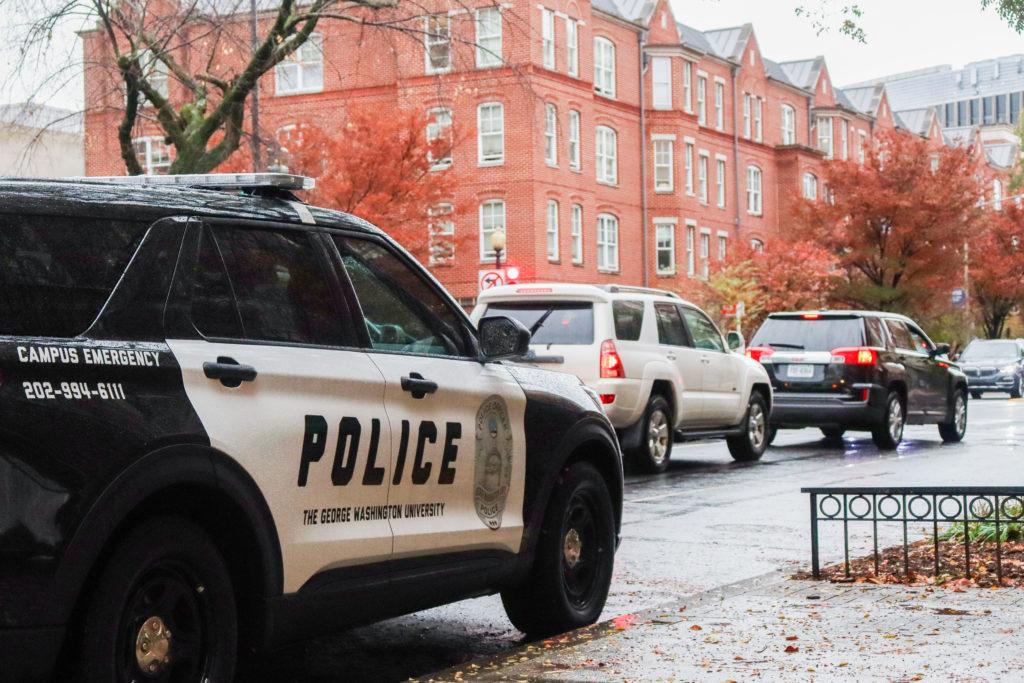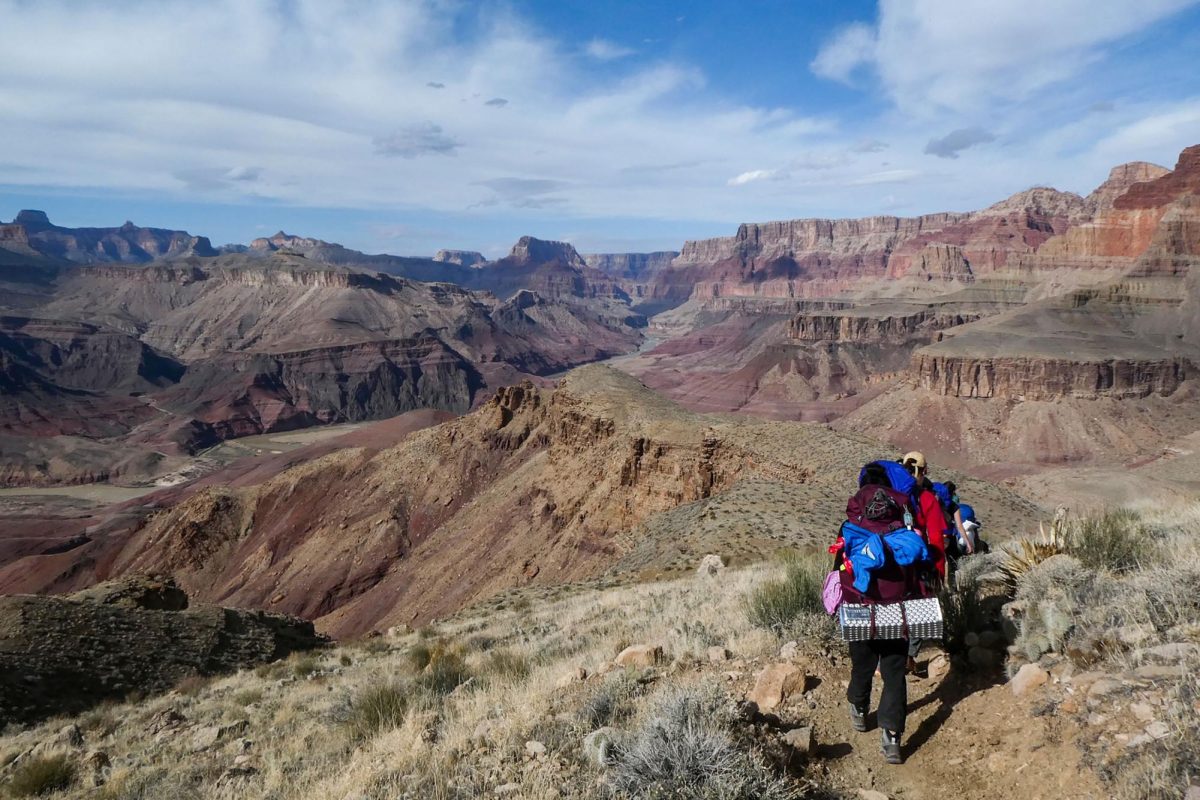The GW Police Department has introduced a pair of trademark events this fall to bolster student outreach efforts as part of GWPD Chief James Tate’s push to establish a culture of community policing in Foggy Bottom.
GWPD kicked off the school year in September with Raise High with GWPD, an event in University Yard where officers handed students food like free Chick-fil-A and pamphlets about the department, before unveiling Coffee with the Chief, where students can discuss campus issues monthly one-on-one with Tate via Webex. More than 10 students said the department’s elevated community engagement efforts have signaled increased transparency from the department, drawing stark differences from a period of limited trust between GWPD and students before Tate arrived at the department in 2020.
“The way to determine if outreach efforts are effective is by listening to students,” Tate said in an email. “We have to connect with students and listen to their feedback. So far, the feedback we have received has been positive. Students have shared that what we are doing is ‘refreshing’ and ‘new.’”
Tate said community outreach has been a “priority” for the department to reform GWPD image on campus since he assumed leadership at the start of 2020 of a department whose leadership had previously hung in question amid fractured student relations. Four months after arriving at GW, Tate called the department’s officer training “woefully inadequate” with minimal deescalation preparation for officers.
BSU published a letter in June 2020 with eight other student organizations to pressure GWPD to restore trust with the GW community through no-tolerance policies for racial bias cases and a lower presence on campus in light of heightened criticism against policing following the Black Lives Matter protests. The letter also came months after GWPD placed an officer on leave who appeared to push a student down a series of steps at a climate justice protest.
Tate said officers have listened to students through discussion opportunities and events as part of their outreach. He said more students have engaged with GWPD events and approached the department to file incident reports than during previous years – an “encouraging” sign of comfort and familiarity with the department.
Tate said the department organized Raise High with GWPD for the first time this year in September for community members to converse with officers in a “nonlaw enforcement capacity,” and he plans to make the event annual on the Mount Vernon and Foggy Bottom campuses. BSU and Fraternity and Sorority Life collaborated with GWPD to host the event, and Tate said the department plans to collaborate with “various campus departments” and District Connections for future outreach events.
“During our community outreach event on U-Yard, student leaders from FSL and BSU volunteered to work alongside our officers at each station, greeting the community and helping build camaraderie, particularly with first-year students,” Tate said. “I’ve worked at several institutions and have never seen anything like it.”
GWPD also introduced Coffee with the Chief this school year, which takes place on the third Thursday of every month where Tate meets with students who can register one week in advance for 15-minute discussion blocks over a two-hour window. Students can discuss matters of public safety and potential community-building events and partnerships, according to the University’s website.
Students said GWPD’s newly introduced campus outreach events have helped familiarize and build trust between Tate and officers and the GW community. Some said the department could continue to build its advertising efforts by focusing on ongoing safety initiatives with more emails and press releases to advertise departmental updates, including those about campus events.
Gianna Cook – a senior majoring in English and the president of BSU, who was also a member of the administration that sent the letter condemning GWPD in 2020 – said GWPD has significantly “evolved” in the past two years. She said prior to Tate’s arrival on campus, GWPD wasn’t helpful to community members because of their lack of familiarity with students, but now she said officers are going out of their way to greet students, attend organization events and offer opportunities for students to talk with them about policy.
“He makes it mandatory for his officers to engage with students on a personal level because he does care about our general well-being in addition to our safety,” Cook said.
Cook said while BSU and GWPD do not currently have plans for an event in the near future, she wants the partnership between the groups to be “continuous” because BSU represents underrepresented minority groups. She said the partnership is “very beneficial” and helps make Black students feel more comfortable with GWPD’s presence on campus.
“I think it helps with the representation aspect of knowing that our voices matter,” Cook said. “I would hope that in the next couple of months and just even years after that, that partnership is still the mindset instead of the us-vs.-them mindset it might have been in the past.”
Michael Graham-Green, a senior majoring in political science, attended Raise High with GWPD in U-Yard last month and said the event demonstrated a willingness among officers to connect with students.
“It’s definitely better than no outreach at all,” Graham-Green said. “I’m not sure if it really made me more likely to interact with GWPD in the future, but it was better than just having them closed off in that building over there and not having any interaction.”
Graham-Green said the event made him more “comfortable” approaching GWPD officers.
“That was probably the best way they could have gone about it to be honest with you,” Graham-Green said. “I’m not sure if it necessarily will make a lasting difference, but I think it’s the best way they could do it.”
Dinorah Martell, a senior majoring in international affairs, said GWPD could promote lesser-known initiatives like its safety app more effectively through increased advertising to better educate the GW community about their resources. She said further promotion of the GW Guardian app, which allows students to be notified if their friends don’t arrive home on time, could help with outreach efforts.
“GW can do more about spreading those kinds of apps instead of GWPD because I hear more from GW than GWPD,” she said.
Lauren Beauvais, an undecided freshman, said the outreach events helped students understand the role of GWPD on campus.
“I think that it allows people to have more of an understanding of what they’re doing so they understand the process better and what their job is,” she said.











